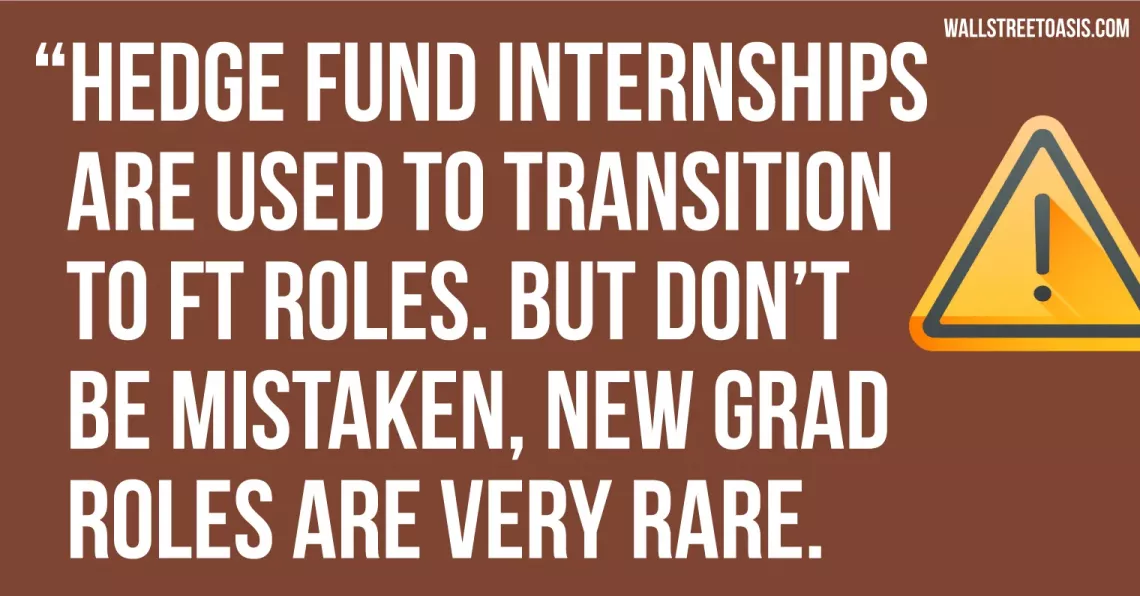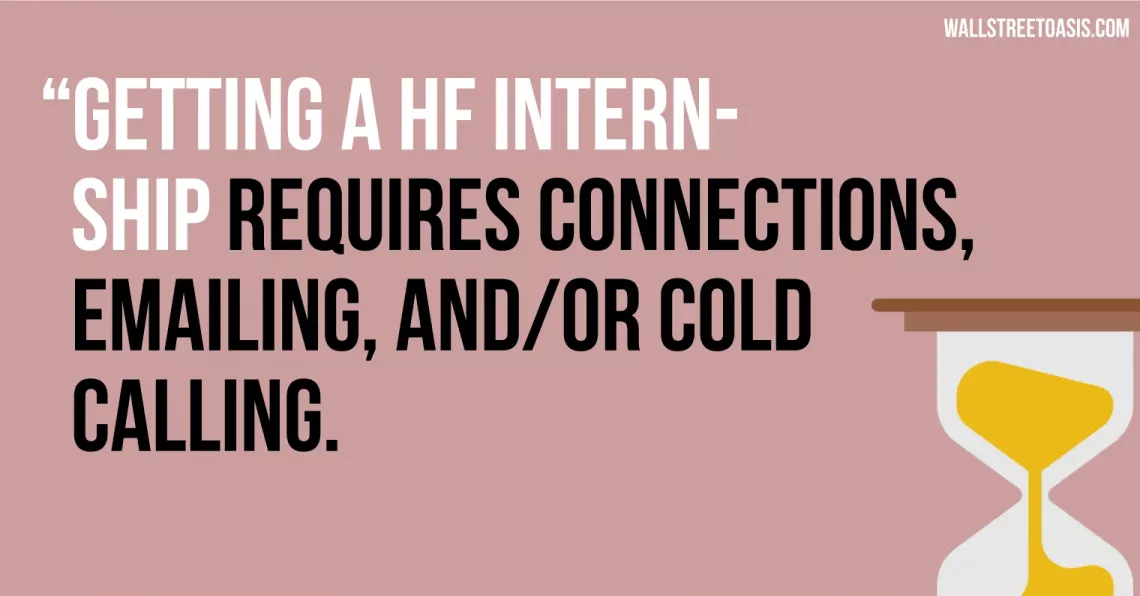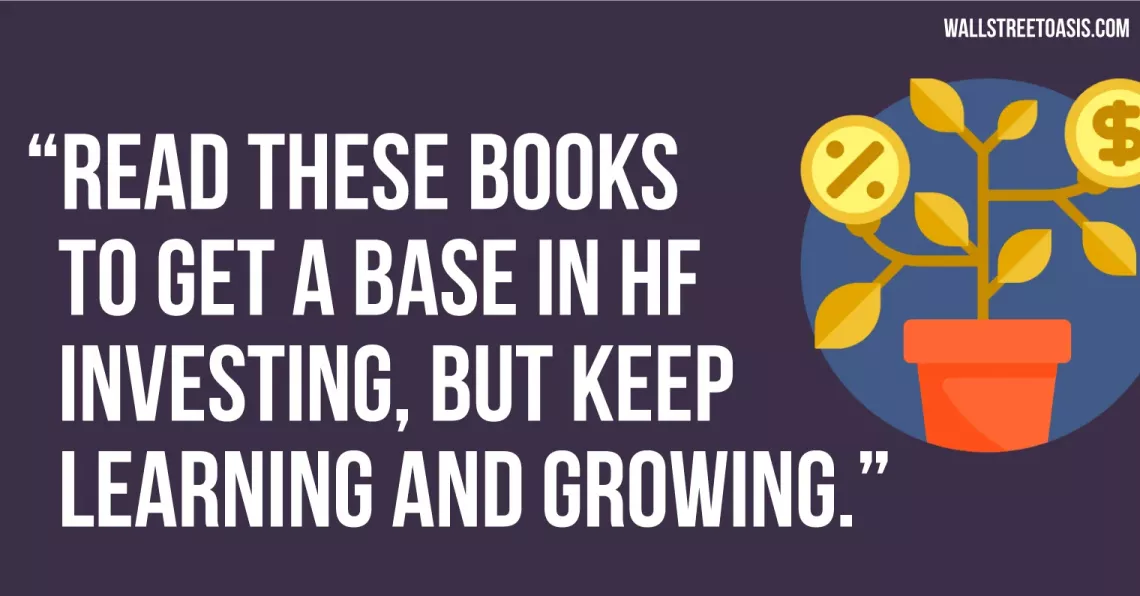How to get a Hedge Fund Internship
There’s a lot of mystery surrounding hedge fund internships. Are they available to people who don’t have connections through family and friends? How do they stack up against other finance internships? Are they viable when the end game is investment banking? What’s the pay like? What do you do during one anyhow?
Most websites supply vague and obvious advice - attend an Ivy, get a perfect GPA, solve world hunger - which is why there’s a lot of confusion. The purpose of this post is to clear up any confusion and provide as much clarity as possible.

Versatility of the Summer Analyst Internship Experience
HF internships establish credibility with investments and understanding the markets, which is why they provide a decent deal of versatility. It’s fairly common for undergraduate students to get one sophomore year and use that as a segue into an investment banking internship junior year.
 Beyond providing a stepping stone, hedge fund internships are used to transition into full-time hedge fund positions right out of undergrad. Don’t be mistaken, landing an analyst role with a hedge fund is extremely rare out of college. Most of the candidates have at least two years of full-time experience in finance. But with an internship, good connections, and demonstrable capabilities as an investor, landing a full-time position at a hedge fund out of college can be done.
Beyond providing a stepping stone, hedge fund internships are used to transition into full-time hedge fund positions right out of undergrad. Don’t be mistaken, landing an analyst role with a hedge fund is extremely rare out of college. Most of the candidates have at least two years of full-time experience in finance. But with an internship, good connections, and demonstrable capabilities as an investor, landing a full-time position at a hedge fund out of college can be done.
Compensation for HF Internships
These internships, like many other internships, come paid and unpaid. You should always assess unpaid internships with caution. There are plenty of paid internships out there, and the pay is pretty decent. You can typically expect around $10-15k for the entire summer, including bonus.
You can check out detailed information regarding hedge fund salaries for internships through the Wall Street Oasis Hedge Fund Industry Report.
Hedge Fund Analyst Hours
 In terms of hours, investment banking internships are notoriously brutal (70-80 hours a week) and reflective of their full-time positions. HF internships are similarly reflective of their full-time positions, only the hours in both cases are more like 50-60 hours (although it certainly gets north of that in some cases).
In terms of hours, investment banking internships are notoriously brutal (70-80 hours a week) and reflective of their full-time positions. HF internships are similarly reflective of their full-time positions, only the hours in both cases are more like 50-60 hours (although it certainly gets north of that in some cases).
Securing a Hedge Fund Internship
There are three ways to get an internship: connections, cold calling, and cold emailing. Cold emailing is how most are obtained.
The majority of available internships are unpublished and obtained through connections. There are three ways these connections are made.
- Connections through connections (e.g., a relative introduces you to a portfolio manager; you meet and get the position)
- Emailing firms
- Cold calling
Ask anyone you might suspect of having relevant connections if they can introduce you to anybody who might help. This is the easiest method of the three, but not everybody has that luxury.
 Cold calling and cold emailing is not easy, and it takes a certain ruthlessness to get the internship. It typically involves calling 100+ firms (usually smaller funds since bigger funds don’t often take interns) to get a shot. You must understand going in that most firms will ignore you. Don’t take it personally. Just keep your head up and eyes out for the next opportunity.
Cold calling and cold emailing is not easy, and it takes a certain ruthlessness to get the internship. It typically involves calling 100+ firms (usually smaller funds since bigger funds don’t often take interns) to get a shot. You must understand going in that most firms will ignore you. Don’t take it personally. Just keep your head up and eyes out for the next opportunity.
Establish a database of numbers and get to calling. You should have an idea of what you want to say, but don’t follow a script. That’s an easy way to come off as disingenuous, and they'll quickly lose interest. You should be able to confidently answer questions about hedge funds and the markets - although that’s more significant for the interviews than the initial call.
Know a little bit about the firm and their investing strategy. During the call, you might get asked something along the lines of, “Tell me about yourself.” This is where you tell them why they should hire you. Give them your elevator pitch. What separates you/makes you a good candidate for an internship? Keep it short. No more than 30 seconds.
Cold Emailing Overview
Cold emailing is the same premise as cold calling. The main difference is what you include. Emails provide the luxury of being able to include a case (a five to eight page investment suggestion) and resume. This is where you demonstrate your interest in investing.
There are two ways you can approach the cold email. You can either try to arrange a phone call/meeting with the person you’re emailing, or you can get straight to the point and ask for an internship. Certain people will appreciate one approach opposed to the other. Success comes mainly with persistence, and both of these approaches can work with consistency. That said, we advocate requesting a phone call/meeting before indicating you want an internship (even though it’s quite implicit).
Our users share their thoughts below and you can also check out a detailed post about cold emailing on WSO.
Overall, hit rates are higher with emails than calls, especially if your case and resume are solid. Here’s a simple, short, and sweet email template from @chillinout". Keep in mind you should use this with your resume and case attached.
Dear (first name),
My name is ____, and I am a second-year student at (HYPS) interested in a career in finance, specifically at a hedge fund. I would appreciate the opportunity to learn more about your career path and your experience at ______. Would it be possible to arrange a short phone call with you to discuss your background and how you got to where you are today?
Thank you in advance for your help.
Best,
_________
You can learn more about cold emailing and case study attachments in this detailed thread on WSO.
The Hedge Fund Interview Process
When it comes to getting the internship, we've established that you're pretty much on your own. When it comes to the interview, it's the same case. Because most HF internships are unpublished and lack the structure that most other internships have, the interviews aren't exactly the most proprietary affairs. They vary a ton by firm. Generally, the larger the fund, the more formal you can expect the interview to be. You're likely to get more technical questions and less behavioral questions.
Here's @Determined", a venture capital associate, on his interview experience with a smaller fund.
I interned at a small value hedge fund in NYC, so maybe I can give you some insight. I got the internship during my Junior year, so I faced mostly behavioral questions. The interviewer also asked me about a stock that I was interested in, but I didn't have to go into great detail pitching it. Most of the time, the senior guy was on his Blackberry the whole time and asked me to elaborate on past experience.
The one thing you should always be prepared for is a stock pitch. Notably, the stock pitch in the experience above was more surface-level. They used it more as a means to ensure interest in the markets and investing. Some funds will have you go more in-depth with your pitch, so you should be able to discuss your stock for at least a few minutes if necessary. In most cases, however, it'll be you mentioning a stock as well as some basic reasoning followed by some simple questions. You're in undergrad applying for an internship; they don't expect you to deliver a lecture on your stock.
You can read more about nailing the stock pitch component of the interview here on WSO.
You should do your best to make your interest in investing palpable without coming off as disingenuous or over enthusiastic. They're considering working with you for three months; make sure you demonstrate your passion and show that you aren't using them as a stepping stone to an investment banking gig - even if you are.
What Should I Read to Learn About Hedge Funds and Investing?
 Investing is integral to hedge funds, finance, and life in general. A lot of kids watch a couple Wall Street movies and think this is the life for them, only to realize investing isn't their cup of tea. The earlier you gauge your interest the better. In the case that you’ve already found a joy for investing, the earlier you immerse yourself, the better. Here are four books to get your feet wet and prepare you for internships, Wall Street, and life.
Investing is integral to hedge funds, finance, and life in general. A lot of kids watch a couple Wall Street movies and think this is the life for them, only to realize investing isn't their cup of tea. The earlier you gauge your interest the better. In the case that you’ve already found a joy for investing, the earlier you immerse yourself, the better. Here are four books to get your feet wet and prepare you for internships, Wall Street, and life.
- Intelligent Investor by Ben Graham
Skip Jason Zweig's commentary - same as above, if I were a high school principal, I would make this required reading before graduation. It's that important.
- Margin of Safety by Seth Klarman
I know, I know, it costs several grand on Amazon. If you do some sleuthing, you might be able to find a PDF.” This and Intelligent Investor will develop your understanding of value investing and form the basis of your investing knowledge. Now we move on to some ancillary pieces.
- The Most Important Thing by Howard Marks
Newer book, but an instant classic. Compiled memos from Oaktree's Howard Marks, one of the smartest men to manage money that I've read.
- Competition Demystified by Bruce Greenwald and Judd Kahn
I think, if you've read Graham, then you know the basic concepts of value investing, as ^ suggested reading Margin of Safety by Klarman would be great to bring a more modern perspective and some specific examples. But I'd suggest branching out beyond basic value philosophy into understanding how to evaluate a business. You've probably heard of the concept of a moat/competitive advantage if you've been exposed to Buffett, but Competition Demystified by Greenwald is a great book which helps you understand how to identify a moat in reality.”
We read to hone our investing minds, sharpen our knowledge, or provide a base where there was none. Once you've read The Intelligent Investor, you need to start reverse engineering great investments to get your own idea of the investment process. That, in addition to reading these books, will put you far, far ahead of your peers.
Here’s @Simple As...", a hedge fund vice president, with more on that.
There's a great deal to be learned from investing books and so forth, but outside of actually learning through trial and error, the best way to learn is to reverse engineer the theses of successful investments by those in the industry you respect.For instance, as great as Buffett's shareholder letters are, reading hundreds of pages of quotes like, "Buy good businesses at good prices" isn't all that useful. If you really look up to the guys at Lone Pine and want to invest like them, then pick one of their successful investments and go back to the filings from the time they initiated the position and try to look for what they saw during DD/idea generation that made the business an attractive investment.
What Do You Do during the HF Internship?
Disclaimer: Work varies by fund. The best we can do is give you a list of things interns do. Some do more; some do less.
Assuming that you landed the internship, its now time to consider what you will actually do when working with a hedge fund. Certain funds dish more responsibility to their lucky interns, who end up doing more due diligence. Others don’t trust their interns as much, which means they end up doing more administrative work and coffee runs.
Here’s a list of things a hedge fund intern will (likely) end up doing:
- Financial modeling
- Data gathering
- Reading 10-Ks and plenty of other materials as diligence
- Researching and pitching a stock (fairly uncommon but not completely unheard of)
- Administrative work (mostly at smaller hedge funds that don’t have employees for this work)
- Data input and data gathering
Interns do some sort of combination of these tasks.
- The luckier ones get to do more stimulating work - modeling, reading reports, and researching a stock.
- The unluckier ones get stuck doing administrative work and a myriad of other tasks classified as grunt work.
It’s hard to predict what you’ll end up doing, but don’t let that scare you away from pursuing a HF internship. Even the unlucky interns walk away with at least some experience, a demonstrable interest in finance and investing, and a greater network. Every internship adds a little credibility to your name until, one day, you’re getting analyzed for full-time positions.
These internships are just a stepping stone - and a fairly good one if you’re considering working full-time at a hedge fund or investment bank.
Want to Intern for a Hedge Fund? Check out the WSO HF Guide
Want access to 20+ more sample pitches with actual templates? The WallStreetOasis hedge fund interview Prep Course has more than enough sample pitches as well as 814 questions across 165 hedge funds. Crowdsourced from over 450,000 members and trusted by over 1,000 aspiring hedge fund professionals just like you, the WSO Hedge Fund Interview Prep Course has everything you’ll ever need to land the most coveted jobs on the buyside.




HF might be tough, but you have a good chance at an IBD internship at a BB
It will be tough. I was lucky and got an opportunity to work at one through an alumni contact. Here's short list of some of the hedge funds in NYC http://richard-wilson.blogspot.com/2008/05/hedge-funds-in-new-york.html There's another list somewhere on this site but I can't remember where it is. Also this list might be slightly outdated.
It takes more than a gpa to get a internship at a hedge fund. Are you a part of a school investment fund if you have one?
Aside from the city, check out the Greenwich and Stamford areas in CT.
Thanks for the comments and resources, i am part of the investment club at the school and know some descent contacts, greenwich and stamford does not seem too bad actually, ill look into it
Yeah it takes more than GPA to get a HF internship; it can even be lower than that but from my experience the majority of them are gotten through connections. Def check out Greenwich and Stamford; I work at one in Greenwich now and it's great. It's tough cause a lot of funds prefer to remain private (mine doesn't let me list its name on LinkedIn). Also, don't expect to get an offer from most funds; only do it for the experience and connections. Good luck.
is it easier or better to start of at as an ER at research firm and then go into the HF after a few years?or should i just go for the smaller funds and learn and make connections starting there? also is Northeastern Univ. or Tulane a target school?
what analyst concentration?
investment and security analysis
Try for small HF. It will come down to networking essentially. But at the same time, apply for ER as well, since that is a natural transition point to HF if you are good.
Think alum-based networking. I was in the same boat (with a lower GPA), and I got a gig through an alum connect. Consider parents' friends, and even their friends' friends. If your parents kibitz even a bit, that can help.
Network, network, network
Have had 2 HF internships and I don't attend an Ivy or have a perfect GPA. All about talking to the right people and showing a passion for learning more.
Hey, I thought I wanted to do Investment Banking but after reading about the hedge fund interviewing process, it seems this is more my avenue. I understand how to reach out to people and connect via LinkedIn etc. However, could you provide me some insight on what to do/prepare before actually applying and connecting with individuals at HFs. I want to make sure I am primed on the information I need to know. I appreciate any advice, thanks.
Undergrad HF Intern Interview (Originally Posted: 03/15/2011)
I have an interview with a hedge fund coming up. This is for my sophomore summer. It is a large fund with 5+ billion in AUM. I have done research on the fund and know its strategy and some of its positions. However, I am mostly concerned with what kind of technicals I could be asked. What kind of technical questions should I be prepared for? Thanks.
maybe how to value a company, dcf calculations, things of that nature--nothing too intense. i would be ready to pitch a stock and have a good analysis of the current market prepared.
Honestly for a sophomore I don't think they're going to expect all that much in terms of technical expertise-I'd know basic finance concepts as mentioned above I doubt they'll try to throw you too much of a curveball.
what role is this for? The preparation varies based on role i.e. trading, ops, accounting, etc.
If you know their strategy read up on the technicals of that.
The job posting mentioned that they take interns in a variety of roles: trading, ops, accounting, etc However, the listing was not for a specific role. I am assuming I will have to answer what role and why during the interview. I plan on saying that I am most interested in a trading role.
I've never heard of a trading HF internship as a sophomore. I don't think it would be out of line (in fact, I would consider it wise) to email HR for some clarity.
Should I just clarify what exactly the position entails? Regardless of whether its trading or not I feel like I would like to pursue it. Finding sophomore internships so far has been difficult.
Yes, I would certainly recommend going into the interview with some background on the position. Personally, the fact that this information hasn't already been communicated should be a yellow (not red) flag.
It could definitely be a red flag, but if this is only the first or second year the firm has taken interns, it might be that they don't have a very formally structured program. If they meant that the interns will do a variety of work in trading, ops, etc. as needed, that would not be uncommon. Politely ask for clarification.
I talked with HR and it is indeed an internship where I would potentially do work in a variety of capacities as needed (trading, ops, etc.) How does this change the way I should be preparing? Do I need to focus a lot on technicals or more on fit questions? Thanks for the help.
As a sophomore, the simple fact that they're bringing you in is indicative enough of their interest in you. Prep for fit. Why hedge, why buy side, why so early, what motivates you, how have you worked in a team scenario, how have you managed responsibility within a group setting, what are your strengths and weaknesses, how have you managed risk in your own life, do you follow the markets and why, all the questions that help them pick your brain to see if you have the motives they want to see.
They (most likely) will not be looking to see complete and dominating technical mastery in a sophomore, simple fact.
Hedge Fund Interview Internship (Originally Posted: 05/18/2011)
Hello, I have an interview for an internship with a small hedge fund tomorrow. Does anyone have experience with what they will ask (Behavioral/Technical or both)? Any advice will be nice. By the way, I am going into my senior year at a non target if that makes any difference. Thanks
Given that it is a small hedge fund I would conclude it would be mainly a mixture of behavioral and technical. If you're assuming an analyst role there, than emphasis on technical skills.
Depends on what type of fund. assuming it is a l/s equity fund they will likely start off with some fit questions then move into your view of the markets and then ask you to tie an investment idea into this thesis. probably one long idea and one short idea.
Give us more info. More about you, more about the firm and more about the position. Then, we can help.
Yep - need more info to help.
i am considering applying for an internship at bracebridge capital partners, a hedge fund with 9blln aum, and was wondering what kinds of questions to expect during an interview i am an electrical engineering major, with no finance experience, at an ivy league school recently got interested in private equity finance, was wondering what kinds of questions to expect on the technical (i have little to no experience in investing) and behavioral sides
Bump
Thought I would give my 2 cents here (might be different at an MBA school program). What I did include an investment thesis (2-page write-up) - assumptions and risk factors with snippets of my DCF operating models. From there I started to directly reaching out to individuals at Hedge Funds (usually would target senior-most person). Took me about several weeks and was able to land a paid internship and another internship at a mid-large fund during the school year. The interview process was intense in the sense that they wanted me to analyze a company (see how I think). From there it was a mutual match, went into the office and spoke with several PMs who wanted to gauge my interest, passion for the markets, know what companies I am following and why. To summarize the key here is to reach out to individuals. PM me for more details.
Ea dolores et et autem id. Nostrum et ut sit voluptas voluptas omnis sed. Et ut est eum quaerat eligendi sint aperiam voluptas. Blanditiis ut ullam id laudantium. Consequuntur assumenda beatae dolorem rem illum laudantium vitae. Veniam voluptates ex enim.
Aliquam assumenda vel unde. Nemo laborum alias debitis distinctio harum. Est sequi incidunt consectetur non maiores. Ipsum sint minima voluptatem consectetur sit. Mollitia doloribus impedit et nobis. Neque numquam dolorem voluptas non suscipit libero. Veniam deleniti eligendi quis quia.
A nemo sint ea omnis corrupti. Nesciunt voluptates quia omnis ea. Nam sapiente voluptas quibusdam aspernatur. Consequatur in et est tempore. Accusantium veritatis voluptas dolorem necessitatibus cupiditate non iusto earum. Corporis est neque illo mollitia nostrum est autem. Impedit omnis autem non quae est.
Quo quasi incidunt in soluta sint voluptatem perferendis. Tempora in voluptatem repellendus nulla. Veniam eum labore officiis sed.
See All Comments - 100% Free
WSO depends on everyone being able to pitch in when they know something. Unlock with your email and get bonus: 6 financial modeling lessons free ($199 value)
or Unlock with your social account...
Commodi quia quo quia laudantium veritatis saepe. Autem aut omnis exercitationem quia autem dolores. Et ut beatae quo sunt vel omnis.
Hic sed culpa quia. Deserunt sed placeat amet labore.